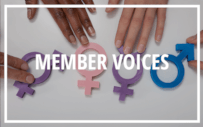
NACE Brief: Understanding the Experiences and Attitudes of LGBTQ+ Students is free to NACE members. There are important—and troublesome—differences in pay, sense of belonging, and job offers that LGBTQ+ students experience during internships that impact their experience in the job search and employment, according to NACE’s newly released brief titled Understanding the Experiences and Attitudes of LGBTQ+ Students.

NACE provided a range of articles and resources around DEI-related topics throughout FY22.

College students who identify as lesbian, gay, bisexual, transgender, or queer (LGBTQ) experience unique challenges in the area of career preparation.

Texas Tech University undertook a study of recruiters at Big XII universities to identify current diversity recruiting practices.

Recently, members of the NACE Community shared resources that they find helpful when working with LGBT college students, job candidates, and employees.

Sandra Buatti-Ramos offers a look at some of the bigger issues trans college students face in their job search and in the workplace; the goal is to provide career services professionals with insights that can help them think about how they can support their trans students in their career decision-making, job search, and career management.

Despite many employers advocating for employees to bring their authentic selves to work, employees that do so may still face hostility from coworkers due to this decision.

Employers and career services professionals should take a proactive approach to ensure their spaces are tangibly inclusive to a multitude of gender identities.

Through diversity in entertainment, students from marginalized groups can discover many career options that they may not have otherwise considered.

The journey to living authentically both personally and professionally is not always a smooth one and can have a lasting impact on the mental health of those who make the decision to do so.

College and university career services practitioners should continuously search for, review, and consider implementing practices that have proven successful in the service of trans students. This article serves as an introduction to successful practices.